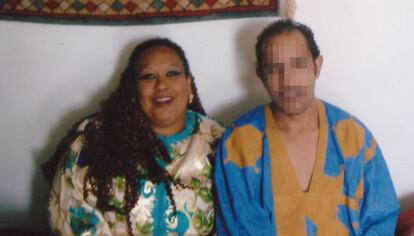Fourteen families from Spain have joined the ranks of ISIS in Syria
Caliphate leaders offer €20,000 bonuses and free homes to married couples with children


The call to fight jihad in Syria and Iraq is not just attracting single youths and family men, who leave their wives and children behind to take up the cause of the Islamic State (ISIS).
Instead, entire families are moving to combat zones, where they are rewarded with bonus payments of as much as €20,000.
Fourteen families whose members are either Spanish or resident in Spain have joined the ranks of ISIS, whose dream of a new caliphate requires not just thousands of foreign combatants to topple the governments of Syria and Iraq, but also women and children to form the foundations of a new society.
Spanish law enforcement investigators said that among the 115 jihadists who have traveled there from Spain, there are 14 families and 20 minors.
Newly formed families
Some Spanish residents have married after traveling to ISIS-controlled areas. Asia Ahmed Mohamed, born in the Spanish exclave city of Ceuta and sister to Yunes, one of the first Spanish suicide bombers in Baghdad, left her parents to marry Mohamed Hamduch. Also known as Kokito, this 28-year-old from Morocco posts pictures of himself on Facebook kneeling next to the severed heads of his victims in Aleppo. "Her parents talk to her through Skype, and she tells them that she is fine and not to worry," says a person who knows the family.
“The total tally is actually higher because we didn’t count children or babies,” said an anti-terrorist source familiar with the situation.
ISIS leaders are seeking unconditionally loyal families who will bow to their stringent goals and rigid lifestyle.
“[ISIS] are raising taxes and murdering religious leaders in the conquered villages,” says a high-ranking official with Spain’s security forces. “The local people fear and occasionally hate them. These families who come from abroad are dependent on ISIS, and work as a counter-balance to that rejection.”
The 14 families who moved from Spain to Syria and Iraq are attracted by the jihadist dream, but also by the money.
“There is a reward for people who move there with wives and children,” explains Dolores Delgado, the High Court prosecutor in charge of international terrorism. “They get paid up to €20,000 if the family has four members. Proportionally it is a lot more than what they give women who travel to get married there, which is between €1,200 and €1,400.”
Loyalty is the most highly prized quality.

“One of ISIS’ goals is to settle and consolidate the population,” says Delgado. “[The foreign families] are not direct combatants but they play an essential role. Those who come from abroad are much more loyal and valuable than the locals. They contribute power, status and security.”
This displacement of entire families to a newly conquered territory had not been seen since the 1990s, when Osama Bin Laden created the first Al Qaeda camps in Afghanistan. But ISIS has changed all that.
“It is unprecedented. The idea of living in an Islamic state, the umma [community]... Entire families are going,” says one police official.
The 26 jihadists who have returned to Spain – 15 of whom are in prison – and security service confidants all provide the same picture of what awaits a family who decides to move to Syria or Iraq.
“They give them a house and pay them a monthly salary. In some cases the families gain more stability than they might have in the countries where they were residing earlier,” says one security expert. “The hook works.”
Allah’s Spanish female fighters
Since January 2014, the police have arrested 13 women for participating in jihadist recruitment or for being recruits themselves. No such arrests had taken place earlier, because no women appeared to be involved in ISIS-related activities.
"This is a rising trend," reads a police report. The latest suspect, a Spanish woman named Silvia Celestín Carrasco, who converted to Islam, "was in direct contact with and received instructions from" an ISIS member. Counter-terrorism services suspect that "other women with similar backgrounds will step up to fill her shoes" on short order.
Tu suscripción se está usando en otro dispositivo
¿Quieres añadir otro usuario a tu suscripción?
Si continúas leyendo en este dispositivo, no se podrá leer en el otro.
FlechaTu suscripción se está usando en otro dispositivo y solo puedes acceder a EL PAÍS desde un dispositivo a la vez.
Si quieres compartir tu cuenta, cambia tu suscripción a la modalidad Premium, así podrás añadir otro usuario. Cada uno accederá con su propia cuenta de email, lo que os permitirá personalizar vuestra experiencia en EL PAÍS.
¿Tienes una suscripción de empresa? Accede aquí para contratar más cuentas.
En el caso de no saber quién está usando tu cuenta, te recomendamos cambiar tu contraseña aquí.
Si decides continuar compartiendo tu cuenta, este mensaje se mostrará en tu dispositivo y en el de la otra persona que está usando tu cuenta de forma indefinida, afectando a tu experiencia de lectura. Puedes consultar aquí los términos y condiciones de la suscripción digital.








































